Abstract
Objective:
To assess, through exploratory research, 1) collegiate coaches' knowledge of eating disorders, 2) the confidence of collegiate coaches in their response correctness to questions about eating disorders among athletes, and 3) demographic data related to prior education about eating disorders and the role of the athletic department in providing such educational experiences.
Design and Setting:
We distributed a 2-part questionnaire to 258 NCAA Division I-A coaches from 5 universities selected by sampling convenience.
Subjects:
One hundred thirty-eight collegiate coaches responded to the questionnaire for a response rate of 53.5%.
Measurements:
Our survey consisted of 30 true-false questions that tested knowledge of eating disorders overall and in 5 domains. These domains included etiology, identifying signs and symptoms, management and treatment, risk factors, and education and prevention of eating disorders. Coaches indicated their level of certainty in their responses by rating their confidence level on a 4-item Likert-type scale. Demographic data focused on educational programs attended by coaches and teams. Descriptive statistics were used to analyze all data.
Results:
Our results suggest a need for coaches to achieve a greater knowledge of eating disorders in all domains. Evidence showed that educational programs about eating disorders were not often sponsored by the athletic department for coaches or athletes. There seemed to be poor communication between athletic departments and coaches regarding the availability of eating disorder educational resources.
Conclusions:
Data suggested coaches could benefit from comprehensive education in all domains of eating disorders; however, further study is needed to validate these findings, to determine the actual effectiveness of education in the prevention of eating disorders, and to differentiate coaches' knowledge specific to sport coached and to coach and team sex.
Keywords: anorexia nervosa, athlete, education, prevention
Full text
PDF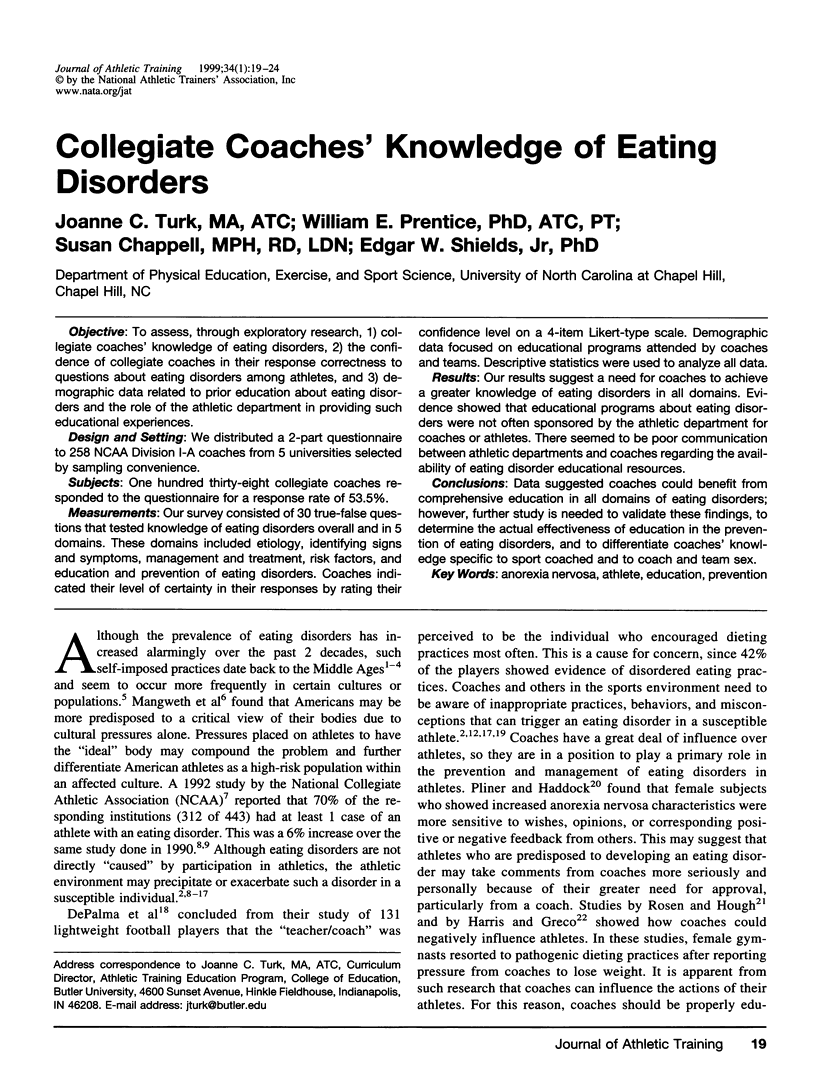
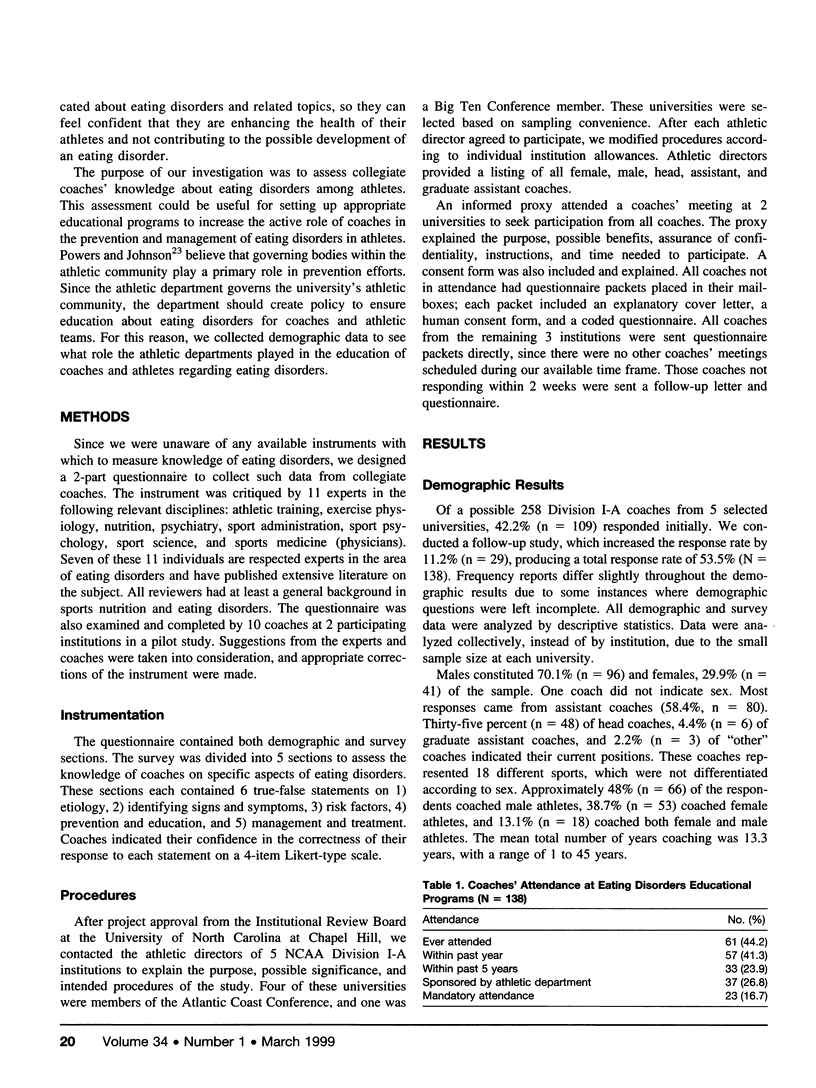
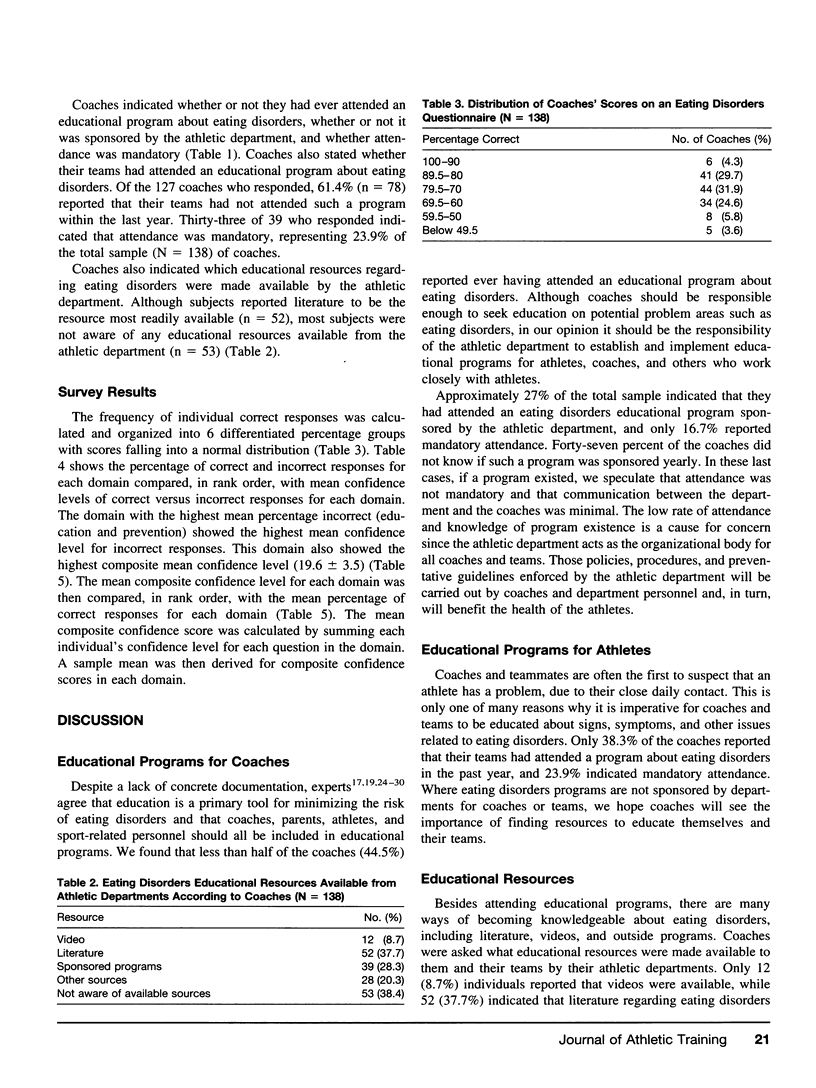
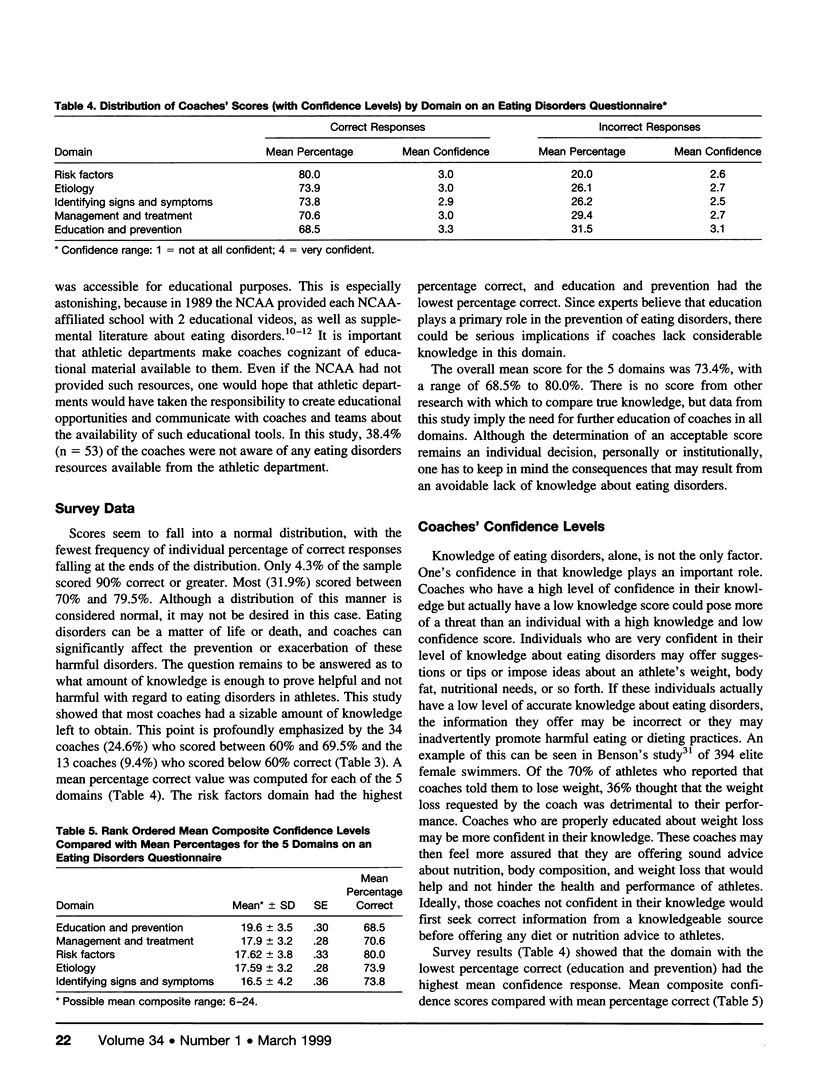
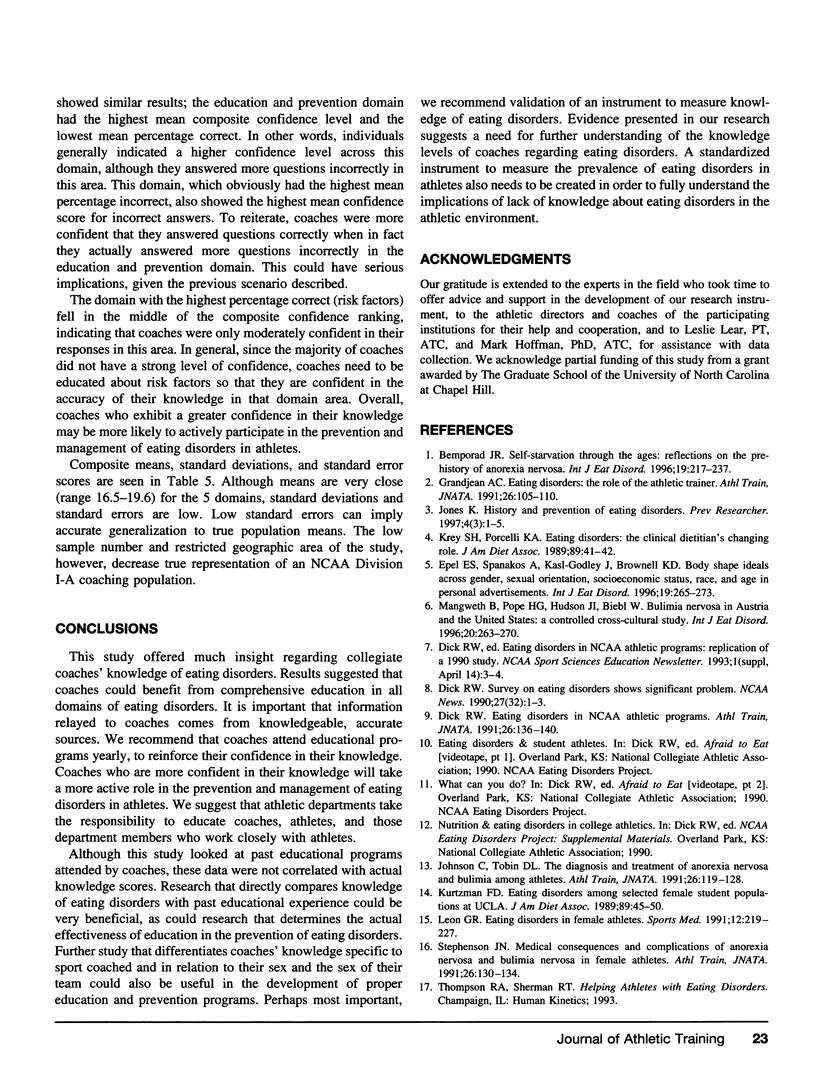
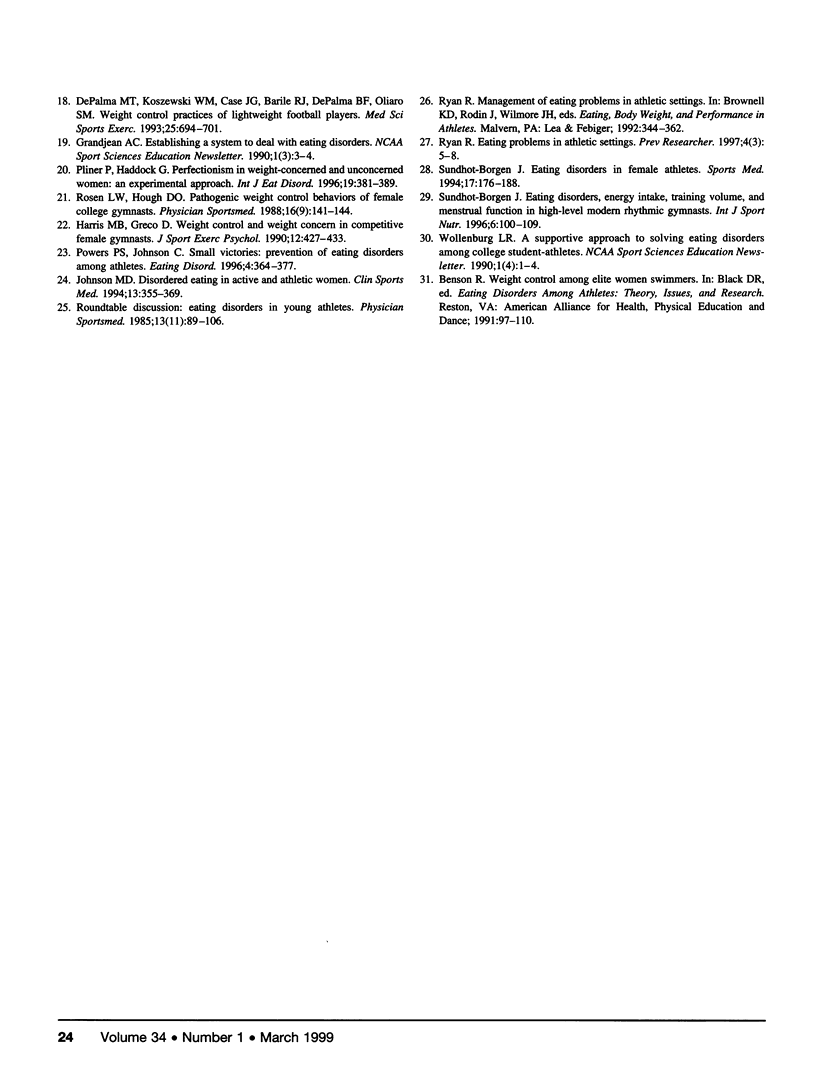
Selected References
These references are in PubMed. This may not be the complete list of references from this article.
- Bemporad J. R. Self-starvation through the ages: reflections on the pre-history of anorexia nervosa. Int J Eat Disord. 1996 Apr;19(3):217–237. doi: 10.1002/(SICI)1098-108X(199604)19:3<217::AID-EAT1>3.0.CO;2-P. [DOI] [PubMed] [Google Scholar]
- DePalma M. T., Koszewski W. M., Case J. G., Barile R. J., DePalma B. F., Oliaro S. M. Weight control practices of lightweight football players. Med Sci Sports Exerc. 1993 Jun;25(6):694–701. [PubMed] [Google Scholar]
- Epel E. S., Spanakos A., Kasl-Godley J., Brownell K. D. Body shape ideals across gender, sexual orientation, socioeconomic status, race, and age in personal advertisements. Int J Eat Disord. 1996 Apr;19(3):265–273. doi: 10.1002/(SICI)1098-108X(199604)19:3<265::AID-EAT5>3.0.CO;2-K. [DOI] [PubMed] [Google Scholar]
- Johnson M. D. Disordered eating in active and athletic women. Clin Sports Med. 1994 Apr;13(2):355–369. [PubMed] [Google Scholar]
- Krey S. H., Palmer K., Porcelli K. A. Eating disorders: the clinical dietitian's changing role. J Am Diet Assoc. 1989 Jan;89(1):41–43. [PubMed] [Google Scholar]
- Kurtzman F. D., Yager J., Landsverk J., Wiesmeier E., Bodurka D. C. Eating disorders among selected female student populations at UCLA. J Am Diet Assoc. 1989 Jan;89(1):45–53. [PubMed] [Google Scholar]
- Leon G. R. Eating disorders in female athletes. Sports Med. 1991 Oct;12(4):219–227. doi: 10.2165/00007256-199112040-00001. [DOI] [PubMed] [Google Scholar]
- Mangweth B., Pope H. G., Jr, Hudson J. I., Biebl W. Bulimia nervosa in Austria and the United States: a controlled cross-cultural study. Int J Eat Disord. 1996 Nov;20(3):263–270. doi: 10.1002/(SICI)1098-108X(199611)20:3<263::AID-EAT5>3.0.CO;2-M. [DOI] [PubMed] [Google Scholar]
- Pliner P., Haddock G. Perfectionism in weight-concerned and -unconcerned women: an experimental approach. Int J Eat Disord. 1996 May;19(4):381–389. doi: 10.1002/(SICI)1098-108X(199605)19:4<381::AID-EAT5>3.0.CO;2-H. [DOI] [PubMed] [Google Scholar]
- Sundgot-Borgen J. Eating disorders in female athletes. Sports Med. 1994 Mar;17(3):176–188. doi: 10.2165/00007256-199417030-00004. [DOI] [PubMed] [Google Scholar]
- Sundgot-Borgen J. Eating disorders, energy intake, training volume, and menstrual function in high-level modern rhythmic gymnasts. Int J Sport Nutr. 1996 Jun;6(2):100–109. doi: 10.1123/ijsn.6.2.100. [DOI] [PubMed] [Google Scholar]


